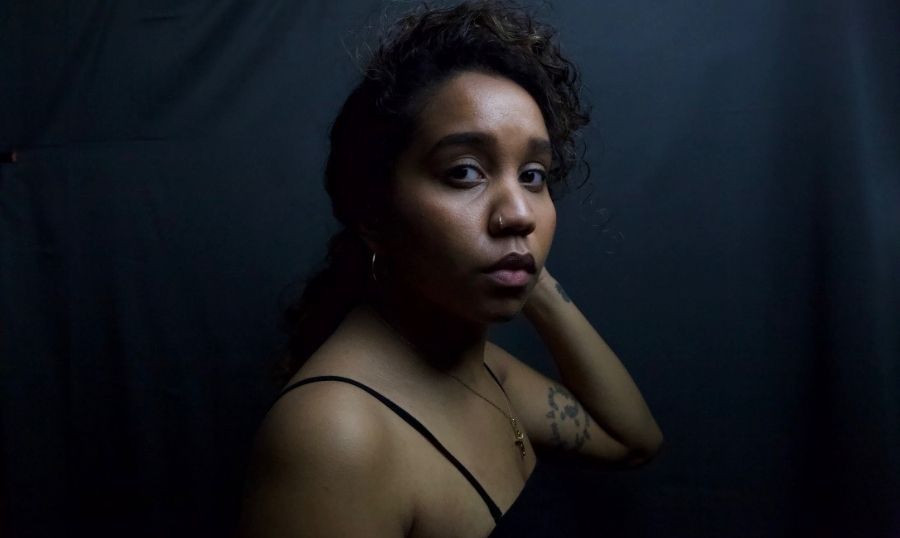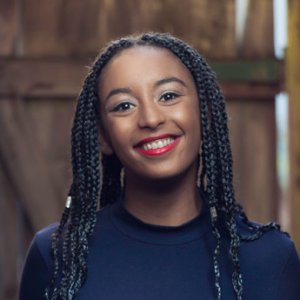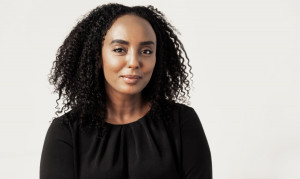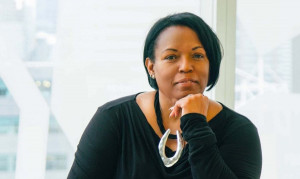McKenzie has always been an artist but has been in the spoken word space for the last 5 years. As a teen, she described herself as “wanting to find a place to share.” For McKenzie, the Toronto Poetry Slam and Bam! Youth Slam were outlets for her to do just that.
“They helped me understand the importance of community,” says McKenzie. “That the art form of spoken word is meant to be shared and that spoken word is taught for communities who need it the most to help amplify their stories.”
She ended up becoming part of JAYU through the iAM Program, an 8-week program offered year-round where youth aged 12-25 from underserved communities receive arts and social justice training from some of Toronto’s most talented artists. More specifically for McKenzie, their poetry program led by Britta B, an award-winning Black Canadian artist, spoken word poet, performer, emcee, voice actor and educator.
Once McKenzie completed the program, she returned to help mentor and eventually began leading her own program. She now helps JAYU in multiple ways, including helping set up the HRFF+ slam poetry evening and the We’ve Been Here Exhibition, a youth-led exhibition featuring self-portraits and poetry capturing young artists’ exploration of truth and reconciliation healing, connection to land and dreams for the future. McKenzie believes the importance of the HRFF+ lies in the “plus” portion of the festival. Not only will they be showcasing documentaries about different global rights issues and stories, but there will also be special activities such as a comedy night, JAYU stages centring women-identifying voices, and a poetry slam night, which Desiree coordinates.
“Not only are there films that share stories, but also a little something for every person, artist and storyteller. There will be workshops for writing, film, and photography that will hopefully help cultivate community,” says Mckenzie.
Not only have JAYU curated an amazing lineup of workshops and films but they have ensured the event is as accessible as possible, meaning everything is free which eliminates barriers to access. Desiree explains that the We’ve Been Here exhibition involves an amazing partnership with the White Owl Native Ancestry association and Wisahkotewinowak in Kitchener-Waterloo. The founder of JAYU and McKenzie led a two-week intensive in poetry and photography.
“The Indigenous youth discussed land sovereignty and dreams for the future as Indigenous youth, with the two weeks culminating in them taking self-portraits and writing poems.”
These works will be featured during the festival with a panel of the young Indigenous artists speaking to their work, offered both virtually and in-person, at the gallery in the JAYU office.
When asked why art and film have such an empathetic pull on people, Desiree points to the origin story of JAYU.
The founder, Gilad Cohen, was assisting North Korean refugees with resettlement efforts. While his family was sympathetic, they weren't as passionate as Cohen until he showed them a film documenting the struggles of North Korean people so they could understand. McKenzie had a similar experience.
"The first few times my parents were brought to a poetry slam and were able to see the vulnerability and storytelling, it helped them understand why I was always writing in my room. Art builds empathy and creates spaces people may never be able to access, helping people build equity and dream of a better future which is really special," says McKenzie.
In a similar vein, Desiree feels the term "artivism" encapsulates the work she is doing with JAYU.
"Black, Indigenous, racialized communities coming together, storytelling and sharing is a form of activism and a form of anti-Black racism. One thing [she] learned after the murder of George Floyd in 2020 is you will never fully understand what a racialized person has been through, but if you can see it and see a person through it, that's what matters most,” says Mckenzie, before adding, “that is what the films [featured at HRFF+] are trying to do, seeing people and giving them the space to say what they need to say."
McKenzie feels that the short-term future for JAYU is making sure events like HRFF+ remain accessible past the pandemic while continuing to offer a virtual component so that anyone can participate in their events. She hopes that participation will continue to grow, that HRFF+ and JAYU will help tell Black and Indigenous histories.
“The best vehicle for education and acknowledgment is through the arts, and through the programs offered at JAYU, I hope people will use the arts to process traumas,” Mckenzie offers, herself using art and poetry to process the good and the bad. She hopes to continue doing so.
Opening night of HRFF+ on December 1st will feature the premiere of “Being Bebe” the first winner of Ru Paul's Drag Race. Bebe will also discuss how they struggled with their queer identity, drag persona and their life story. There will be a Q&A after with Bebe themselves, and both the showing and Q&A will be available in-person or virtually.
To learn more about HRFF and JAYU visit https://www.jayu.ca/

 By
By 


